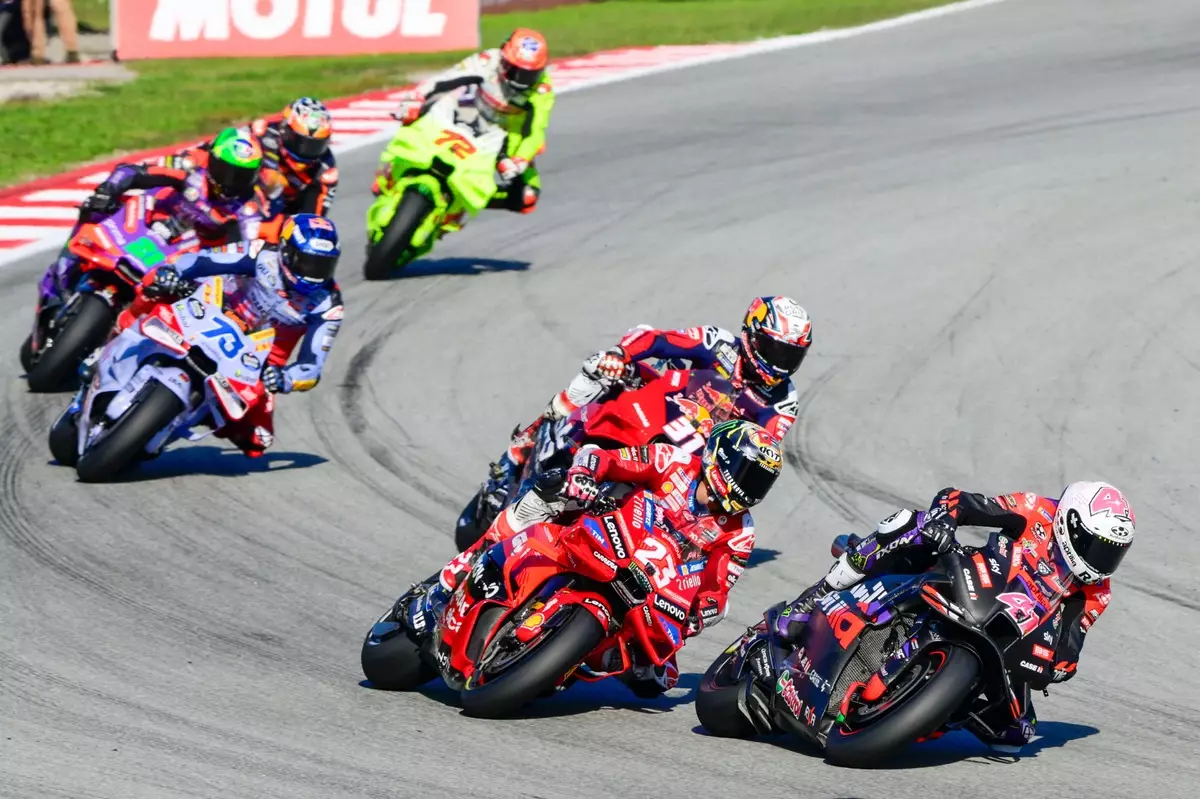In the high-octane world of MotoGP, rivalries and alliances are as crucial as speed and technique on the track. The Barcelona Grand Prix showcased a complex web of friendships and competitive spirit that ultimately became contentious, particularly between Ducati’s Enea Bastianini and Aprilia’s Aleix Espargaro. Their exchange post-race revealed underlying tensions that accompany the fierce world of competitive motorcycle racing, where every position matters and friendships can lead to complications.
At the heart of the controversy is the race itself. Starting from a promising second position, Espargaro’s performance was less about personal ambition and more about supporting his compatriot, Jorge Martin, in his quest for the championship. Bastianini, on the other hand, sought to capitalize on any opportunity to secure points for himself, particularly in light of the title race against Francesco Bagnaia. His attempts to challenge Espargaro met with staunch resistance, which Bastianini interpreted as an act of betrayal lacking professionalism.
As the race unfolded, Bastianini’s frustration mounted. His efforts to overtake Espargaro proved futile, leading him to reflect on how a different approach from the Aprilia racer could have altered his own race outcome. The Italian’s claims point to a broader issue within the sport regarding the ethics of racing: Should riders prioritize team dynamics over individual ambitions, especially when their actions potentially inhibit a fellow competitor’s performance?
Bastianini’s refrain of frustration turned into a powerful critique of Espargaro’s tactics. He contextualized his feelings, suggesting that Espargaro’s actions not only affected his own result but also undermined the integrity of the championship. His assertion that Espargaro’s defense was notably unprofessional raises an important ethical question: Should a racer sacrifice their own potential for the sake of a teammate, particularly in a personal capacity as strong as that between Espargaro and Martin?
As the race concluded, Bastianini’s inability to secure a podium position was painful, especially considering his placement in the overall championship rankings. The Italian’s tactical maneuvers were stymied, leading him to finish the race in seventh position, far from where he likely believed he belonged. While Bastianini’s frustration is understandable given the competitive stakes, one must also ponder the implications of a racer prioritizing camaraderie over competition.
Espargaro’s counter-argument passionately highlighted the bond he shares with Martin. In racing, friendship often translates into loyalty on the track, leading riders to make choices that may confuse or frustrate others. He described Martin as a “little brother,” signifying not just friendship but a mentorship dynamic that transcends the racetrack. This emotional support adds another layer of complexity to their affiliations, warranting a better understanding of the psychology of racing alliances.
While Espargaro insisted that he was not intentionally riding slowly to impede Bastianini’s progress, his commitment to defending Martin raises pertinent questions about his racing ethics. Indeed, his claim of fighting until the penultimate lap, despite losing fourth position to Alex Marquez, underscores the pressures drivers face when balancing competitive instincts with friendships. In a sport where milliseconds determine ranking, the pressure to maintain alliances can lead to choices that are contentious and ultimately arms-race-like among competitors.
The Bastianini-Espargaro saga at the Barcelona Grand Prix encapsulates the delicate balance between competition and camaraderie in MotoGP. While both riders had their reasons for acting as they did, the incident provides a stark reminder of the broader implications of personal relationships in sport.
Racing, at its core, is a fierce contest where speed and precision reign supreme. However, the interplay of friendship and rivalry is a compelling narrative that adds depth to the sport’s fabric. As Bastianini and Espargaro continue to navigate their careers, the Barcelona event will likely serve as a reference point for discussions on sportsmanship, competitive ethics, and the tangled web of alliances that characterize MotoGP. As the 2025 championship year approaches, with Martin set to join Espargaro’s team, one can only hope that the lessons learned will foster more races defined by pure competition rather than the overshadowing influence of personal alliances.

